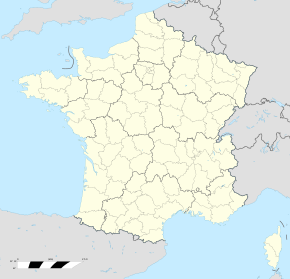Pointe du Hoc
| Battle of Pointe du Hoc | |||||||
|---|---|---|---|---|---|---|---|
| Part of Normandy Landings | |||||||
 Map of Pointe du Hoc, showing German installations and what was believed to be the locations of the 155mm guns. |
|||||||
|
|||||||
| Belligerents | |||||||
|
|
|
||||||
| Commanders and leaders | |||||||
|
|
|
||||||
| Units involved | |||||||
| Strength | |||||||
| 225 infantry 2 battleships |
200 infantry 4 machine gun emplacements 6 empty casemates 1 observation bunker |
||||||
| Casualties and losses | |||||||
| 135 killed/wounded |
Landing: unknown Counter-attacks: 50 Germans killed and 40 captured. Unknown number of French collaborators executed. |
||||||
|
|
|||||||
Pointe du Hoc (French pronunciation: [pwɛ̃t dy ɔk]) is a promontory with a 100 ft (30 m) cliff overlooking the English Channel on the coast of Normandy in northern France. During World War II it was the highest point between Utah Beach to the west and Omaha Beach to the east. The German army fortified the area with concrete casemates and gun pits. On D-Day (6 June 1944) the United States Army Ranger Assault Group assaulted and captured Pointe du Hoc after scaling the cliffs.
...
Wikipedia

